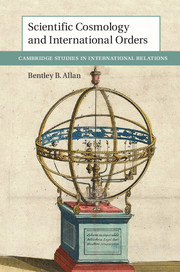Refine search
Actions for selected content:
10305 results in History of science: general interest
Carl A. Zimring, Aluminum Upcycled: Sustainable Design in Historical Perspective. Baltimore: Johns Hopkins University Press, 2017. Pp. 199. ISBN 978-1-4214-2186-5. $39.95 (hardcover).
-
- Journal:
- The British Journal for the History of Science / Volume 51 / Issue 2 / June 2018
- Published online by Cambridge University Press:
- 31 May 2018, pp. 317-319
- Print publication:
- June 2018
-
- Article
- Export citation
Andreas Marklund and Mogens Rüdiger (eds.), Historicizing Infrastructure. Aalborg: Aalborg University Press, 2017. Pp. 235. ISBN 978-87-7112-594-8. DKr 298.00 (hardcover).
-
- Journal:
- The British Journal for the History of Science / Volume 51 / Issue 2 / June 2018
- Published online by Cambridge University Press:
- 31 May 2018, pp. 324-326
- Print publication:
- June 2018
-
- Article
- Export citation
Lisa Vox, Existential Threats: American Apocalyptic Beliefs in the Technological Era. Philadelphia: University of Pennsylvania Press, 2017. Pp. xvi + 266. ISBN 978-0-8122-4919-4. $55.00 (cloth).
-
- Journal:
- The British Journal for the History of Science / Volume 51 / Issue 2 / June 2018
- Published online by Cambridge University Press:
- 31 May 2018, pp. 319-321
- Print publication:
- June 2018
-
- Article
- Export citation
Roland Wittje, The Age of Electroacoustics: Transforming Science and Sound. Cambridge, MA and London: MIT Press, 2016. Pp. 297. ISBN 978-0-262-03526-2. $40.00/£32.95
-
- Journal:
- The British Journal for the History of Science / Volume 51 / Issue 2 / June 2018
- Published online by Cambridge University Press:
- 31 May 2018, pp. 326-328
- Print publication:
- June 2018
-
- Article
- Export citation
Relocating anti-racist science: the 1950 UNESCO Statement on Race and economic development in the global South
-
- Journal:
- The British Journal for the History of Science / Volume 51 / Issue 2 / June 2018
- Published online by Cambridge University Press:
- 07 May 2018, pp. 281-303
- Print publication:
- June 2018
-
- Article
- Export citation

Scientific Cosmology and International Orders
-
- Published online:
- 27 April 2018
- Print publication:
- 19 April 2018
Index
-
- Book:
- Scientific Cosmology and International Orders
- Published online:
- 27 April 2018
- Print publication:
- 19 April 2018, pp 331-338
-
- Chapter
- Export citation
1 - Introduction: Science and the Transformation of International Politics
-
- Book:
- Scientific Cosmology and International Orders
- Published online:
- 27 April 2018
- Print publication:
- 19 April 2018, pp 1-28
-
- Chapter
- Export citation
Methodological Appendix
-
- Book:
- Scientific Cosmology and International Orders
- Published online:
- 27 April 2018
- Print publication:
- 19 April 2018, pp 285-293
-
- Chapter
- Export citation
4 - Darwin, Social Knowledge, and Development in the British Colonial Office and the League of Nations, 1850–1945
-
- Book:
- Scientific Cosmology and International Orders
- Published online:
- 27 April 2018
- Print publication:
- 19 April 2018, pp 139-206
-
- Chapter
- Export citation
6 - Conclusion: The Future of Cosmological Change
-
- Book:
- Scientific Cosmology and International Orders
- Published online:
- 27 April 2018
- Print publication:
- 19 April 2018, pp 263-284
-
- Chapter
- Export citation
Tables
-
- Book:
- Scientific Cosmology and International Orders
- Published online:
- 27 April 2018
- Print publication:
- 19 April 2018, pp xi-xi
-
- Chapter
- Export citation
5 - Neoclassical Economics and the Rise of Growth in the World Bank and Postwar International Order, 1945–2015
-
- Book:
- Scientific Cosmology and International Orders
- Published online:
- 27 April 2018
- Print publication:
- 19 April 2018, pp 207-262
-
- Chapter
- Export citation
3 - Natural Philosophy in Balance of Power Europe, 1550–1815
-
- Book:
- Scientific Cosmology and International Orders
- Published online:
- 27 April 2018
- Print publication:
- 19 April 2018, pp 75-138
-
- Chapter
- Export citation
Figures
-
- Book:
- Scientific Cosmology and International Orders
- Published online:
- 27 April 2018
- Print publication:
- 19 April 2018, pp x-x
-
- Chapter
- Export citation
References
-
- Book:
- Scientific Cosmology and International Orders
- Published online:
- 27 April 2018
- Print publication:
- 19 April 2018, pp 294-330
-
- Chapter
- Export citation
Contents
-
- Book:
- Scientific Cosmology and International Orders
- Published online:
- 27 April 2018
- Print publication:
- 19 April 2018, pp ix-ix
-
- Chapter
- Export citation
Acknowledgements
-
- Book:
- Scientific Cosmology and International Orders
- Published online:
- 27 April 2018
- Print publication:
- 19 April 2018, pp xii-xiv
-
- Chapter
- Export citation
Copyright page
-
- Book:
- Scientific Cosmology and International Orders
- Published online:
- 27 April 2018
- Print publication:
- 19 April 2018, pp vi-vi
-
- Chapter
- Export citation
Dedication
-
- Book:
- Scientific Cosmology and International Orders
- Published online:
- 27 April 2018
- Print publication:
- 19 April 2018, pp vii-viii
-
- Chapter
- Export citation
